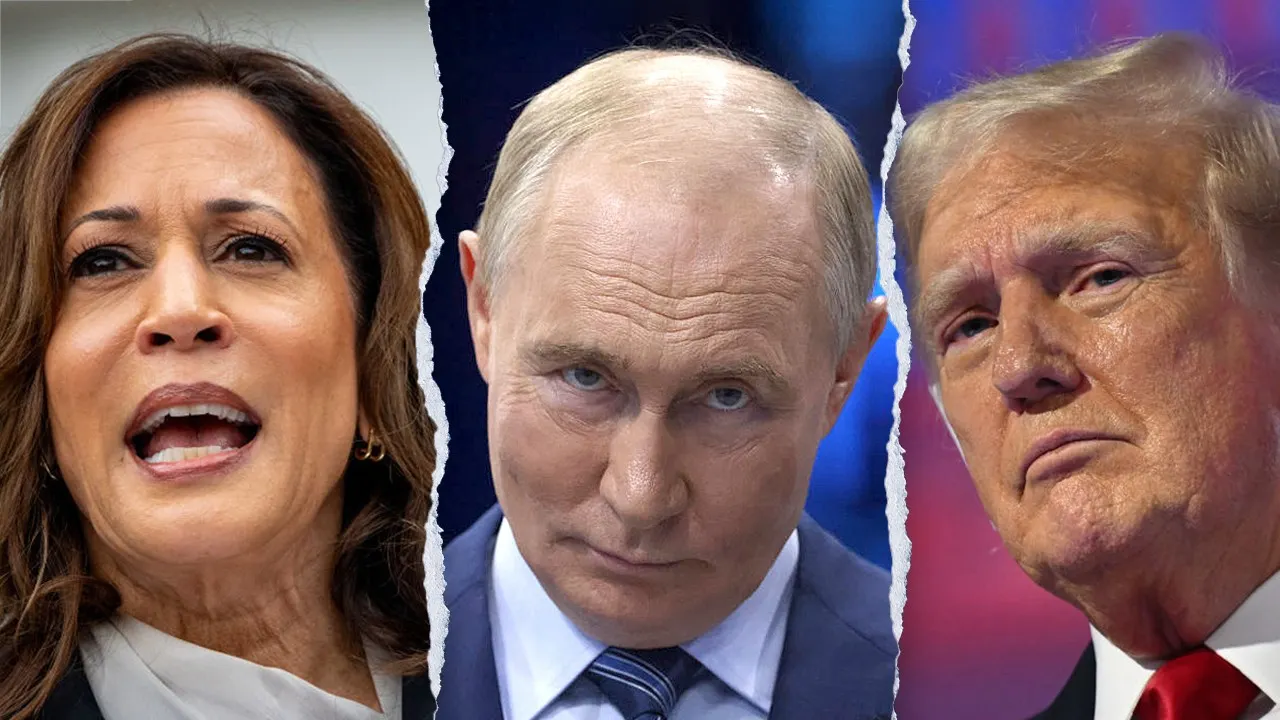Oh, finally. So many American voters were waiting with bated breath not knowing whom to vote for. Now that Putin has made his endorsement, they can all run to their ballots with confidence.
‘Russia backs Kamala Harris’: Putin’s history of US election ‘endorsements’
For two decades, President Putin has stirred the US election pot, including by signalling support for candidates.www.aljazeera.com

Why Putin prefers Harris over Trump in the White House
Russian President Vladimir Putin favors Vice President Kamala Harris over former President Trump in the race to become president. Moscow views her as incompetent and therefore good for Russia.www.foxnews.com

Donald Trump jabs back after Vladimir Putin jokingly backs Kamala Harris
“I don’t know if I’m insulted or he did me a favor,\www.usatoday.com
Why would putin give support to Kamal Harris, when he is rumored to have good relations with Donald trump?
So, that people will think russia supports Kamal Harris ?
So it might be to help trump win, when people will think kamala Harris is being supported by an enemy of the state?
A false flag operation?
Love for IK, in the public's heart, just doesn't seem to erode away ?
Be it cipher, tosha khana, £ 190 million, now this etc etc
Navigation
Install the app
How to install the app on iOS
Follow along with the video below to see how to install our site as a web app on your home screen.
Note: This feature may not be available in some browsers.
More options
Style variation
You are using an out of date browser. It may not display this or other websites correctly.
You should upgrade or use an alternative browser.
You should upgrade or use an alternative browser.
An Unlikely Ally: How Imran Khan Could Shape Israeli-Pakistani Relations: Times of Israel
- Thread starter FOOLS_NIGHTMARE
- Start date
- Status
- Not open for further replies.
ACE OF HEARTS
Member
- Mar 26, 2024
- 51
- 47
- Country of Origin

- Country of Residence


Analysis: One wedding and two prime ministers
The ties between Pakistan, India are marked by short positive bursts with vast frustrating stretches in the middle.
www.dawn.com

At lunch with MPs, PM Modi talks about surprise 2015 visit to Lahore: Sources
Prime Minister Narendra Modi went to Lahore in 2015 and met then Pakistani Prime Minister Nawaz Sharif on the latter's 66th birthday.

Narendra Modi 'allowed' Gujarat 2002 anti-Muslim riots
Gujarat's chief minister deliberately allowed anti-Muslim riots in 2002, which left more than 1,000 people dead, India's Supreme Court hears.
www.bbc.com

Timeline of the Riots in Modi’s Gujarat (Published 2014)
Explore key developments in the 2002 riots in Gujarat that shadowed Narendra Modi’s ascent to the prime minister’s office.
The ruling family today, back then aswel, including the servants if the people, should be asked why did they thought of practically demonstrating soo much love for a criminal responsible for killing thousands of Muslims, in your neighbour country?
Forsvaret
Full Member
- Dec 23, 2023
- 1,124
- 1,065
- Country of Origin

- Country of Residence

Donkey Patwari - it’s a blog - not an official Times of Israel editorial.Congratulations to all youthias. Now Times of Israel has come to the open in support of charsi khota
Forsvaret
Full Member
- Dec 23, 2023
- 1,124
- 1,065
- Country of Origin

- Country of Residence

It’s because Arabs are pro-Israel and pro-US!Shame on brainless youthias for their inability to see even an exposed enemy mole.
BTW, no Arab admires this Zionist mole in Pakistan. No Arab leader has ever said a single word in his support while he is rotting in Pakistani jail. They don't want even to hear his name.
Forsvaret
Full Member
- Dec 23, 2023
- 1,124
- 1,065
- Country of Origin

- Country of Residence

Source?Zionist Israel is the only country in world that has raised voice in support of Zionist mole in Pakistan, the charsi khota, at the UN platform.
ziaulislam
Elite Member
- Apr 22, 2010
- 25,172
- 24,470
- Country of Origin

- Country of Residence

Agree all Pakistanis youthias are Israeli loving only nawaz sharif waged jihad against Israel since 1977..his 40 yrs struggle against Israel is reason why Palestinians are alive.asim munir will free PalestineCongratulations to all youthias. Now Times of Israel has come to the open in support of charsi khota asking all allies of Israel to do everything possible to get the chersi khota out of Pakistani jail. Why? According to the writer, charsi khota is the only leader that can normalize Pakistan-Israel relations, and he has sent his desire to do so multiple times through Goldsmithms.
These Zionist war criminals, the murderers of tens of thousands of Palestinian babies, are now overtly trying to save their asset in Pakistan.
lo ji, iss aalime-islam ke charsi leader ko azaad karwane ke liay Zionists khul kar saamne a gai hain.
Just like how zia showed freedom to Palestinians in Jordon
Godspeed bakhtawar for your jihad
Forsvaret
Full Member
- Dec 23, 2023
- 1,124
- 1,065
- Country of Origin

- Country of Residence

Yes, just read the posts of @FOOLS_NIGHTMARE @prothought and otherJust wondering how dense one has to be to swallow this new Establishment/PML-N nonsense? Ya saray Pakistan ko Patwari samajh rakha hai?
Also, who will ask the other "servants of people" responsible for killing hundreds of thousands of Muslims in a neighbor to a neighbor country?
Analysis: One wedding and two prime ministers
The ties between Pakistan, India are marked by short positive bursts with vast frustrating stretches in the middle.www.dawn.com

At lunch with MPs, PM Modi talks about surprise 2015 visit to Lahore: Sources
Prime Minister Narendra Modi went to Lahore in 2015 and met then Pakistani Prime Minister Nawaz Sharif on the latter's 66th birthday.www.indiatoday.in

Narendra Modi 'allowed' Gujarat 2002 anti-Muslim riots
Gujarat's chief minister deliberately allowed anti-Muslim riots in 2002, which left more than 1,000 people dead, India's Supreme Court hears.www.bbc.com

Timeline of the Riots in Modi’s Gujarat (Published 2014)
Explore key developments in the 2002 riots in Gujarat that shadowed Narendra Modi’s ascent to the prime minister’s office.www.nytimes.com
The ruling family today, back then aswel, including the servants if the people, should be asked why did they thought of practically demonstrating soo much love for a criminal responsible for killing thousands of Muslims, in your neighbour country?

The Genocide the U.S. Can't Remember, But Bangladesh Can't Forget
Millions were killed in what was then known as East Pakistan, but Cold War geopolitics left defenseless Muslims vulnerable
It was only a matter of time before this domestic water buffalo would say something stupid and irrelevant. Then all the village mental virgins who never thought in their God-forsaken life would respond. The last one anyone needs advice from is this offspring of a known thief who served time in jail and has a moniker as Mr. 10 percent.
Jahil nation.
Fatman17
THINK TANK: CONSULTANT
- Apr 24, 2007
- 37,383
- 43,757
- Country of Origin

- Country of Residence

Not happening at allPakistan’s Historical Stance on Israel
Pakistan has long been one of the staunchest supporters of the Palestinian cause, arguably more so than many other Muslim-majority countries. This position is rooted deeply in Pakistan’s identity as an Islamic Republic and its broader commitment to the ummah, or global Muslim community. The notion of recognizing Israel has historically been seen as contradictory to this identity, particularly given the country’s foundational links to the larger Islamic world.
The pro-Palestinian stance is not only political but also deeply embedded in Pakistani society and public opinion. This is reflected in the consistent policies of successive Pakistani governments, which have included open condemnations of Israel’s actions in the Palestinian territories, refusal to engage in diplomatic relations, and support for Palestinian statehood at international forums such as the United Nations.
The intensity of Pakistan’s anti-Israel sentiment can be traced back to its founding in 1947, during which it sought to establish itself as a leader of the Muslim world, aligning with other Muslim nations that opposed the creation of Israel. This alliance was further solidified through Pakistan’s membership in the Organization of Islamic Cooperation (OIC) and other Islamic blocs, where the Palestinian cause has remained a central issue.
Imran Khan’s Public Stance and Strategic Calculations
During his tenure as Prime Minister, Imran Khan publicly maintained Pakistan’s traditional support for the Palestinian cause. He condemned Israeli actions in Gaza, voiced support for Palestinian rights, and dismissed the idea of normalizing relations with Israel as long as the Palestinian issue remained unresolved. These positions were consistent with both domestic expectations and Pakistan’s longstanding foreign policy.
However, Imran Khan’s tenure was marked by a pragmatic approach to foreign relations, often characterized by a balancing act between public rhetoric and behind-the-scenes diplomacy. Khan’s pragmatism is evident in his broader foreign policy maneuvers, where he sought to strengthen ties with both traditional allies like China and Saudi Arabia and to open channels with adversaries when it suited Pakistan’s interests. This approach suggests that Khan may have been more open to reevaluating Pakistan’s position on Israel than his public statements indicated.
The Influence of the Goldsmith Family and Western Elites
Imran Khan’s close relationship with the Goldsmith family, particularly his ex-wife Jemima Goldsmith, is well-documented and plays a significant role in understanding his potential shift in stance towards Israel. The Goldsmith family is part of the British elite, with Zac Goldsmith, Jemima’s brother, having been involved in British politics, including a bid for the London mayoralty.
Zac Goldsmith’s connections to Jewish and pro-Israel circles in the UK, along with the broader influence of the family within Western elite circles, could have provided Khan with a different perspective on Israel. Khan’s support for Zac Goldsmith in the London mayoral election, even against a fellow Muslim candidate, Sadiq Khan, underscores his loyalty to the family and their broader network, which in turn have supported him in the past.
There have been reports suggesting that Imran Khan sent messages to Israeli officials through the Goldsmith family, signaling a potential willingness to consider normalizing relations between Pakistan and Israel and his willingness to moderate the religious discourse in Pakistan. If these reports are accurate, they suggest a level of flexibility in Khan’s approach to Israel that goes beyond the traditional Pakistani stance. This potential willingness to engage with Israel could be seen as a strategic move to align Pakistan’s foreign policy with the changing dynamics of the Middle East.
The Potential for Mediation and Regional Shifts
Imran Khan’s Western education and his ability to navigate between different cultural and political spheres position him uniquely as a potential mediator between Israel and Muslim states. His tenure as Prime Minister was marked by efforts to improve relations with key Middle Eastern players like Saudi Arabia and the UAE—both of which have shown signs of warming relations with Israel through the Abraham Accords and other normalization efforts.
Khan’s ability to bridge gaps between the West and the Islamic world could theoretically allow him to play a similar role in Israeli-Pakistani relations, if he were to return to power. His personal relationships and strategic outlook could be leveraged to mediate between Israel and other Muslim-majority countries, contributing to a broader regional realignment.
However, any attempt by Khan to shift Pakistan’s stance on Israel would be fraught with challenges. The political landscape in Pakistan is heavily influenced by religious organizations, many of which hold strong anti-Israel sentiments. Public opinion is also overwhelmingly against recognizing Israel, and any move towards normalization would likely face significant backlash from both the public and religious leaders.
Despite these challenges, Khan has previously shown a willingness to challenge the status quo, particularly in areas like education reform and women’s rights, where he has taken on powerful religious organizations. This suggests that he might be willing to take a more nuanced approach to Israel if he believes it could serve Pakistan’s broader strategic interests.
Speculation in a Rapidly Changing Middle East
While the idea of Imran Khan shaping Israeli-Pakistani relations remains speculative, it is not without merit given the rapidly changing geopolitical dynamics in the Middle East. The normalization of relations between Israel and several Arab states has shown that long-standing hostilities can be overcome through pragmatic diplomacy. These developments suggest that other Muslim-majority countries, including Pakistan, could potentially reevaluate their positions on Israel in the future.
The Middle East is in the midst of a significant realignment, driven by shifting alliances, economic interests, and the shared threat of extremism. In this context, Imran Khan’s potential role in shaping Pakistani-Israeli relations serves as a reminder that diplomacy often involves unconventional thinking and unexpected alliances. As the region continues to evolve, Pakistan’s foreign policy may also adapt in ways that were previously unthinkable, potentially opening the door to a new era of relations between Israel and the broader Islamic world.
Israel and its allies must do whatever they can to insure that Imran Khan is free again to participate in Pakistani politics and be the voice that channels moderation. Imran Khan’s unique position, relationships, and strategic thinking could influence Israeli-Pakistani relations, despite the significant challenges and opposition he would likely face in attempting such a shift.
GatlingGun
Full Member
- Feb 9, 2024
- 658
- 655
- Country of Origin

- Country of Residence

Absolutely true. I was in the room when Netanyahu and Imran Khan were making out

prothought
Full Member
- Dec 25, 2023
- 394
- 414
- Country of Origin

- Country of Residence

Source?

FO says Israel’s criticism of human rights in Pakistan ‘politically motivated’
"Given Israel’s long history of oppression of Palestinians, Pakistan can certainly do without its advice on protecting human rights," FO says.
www.dawn.com
Ex-Pakistan PM Imran Khan arbitrarily detained, says UN working group.
Israel’s Permanent Representative to the UN, Adi Farjon, said: “Israel believes that it is essential that Pakistan heeds our recommendations to take all appropriate steps to prevent arbitrary arrests, torture and other ill-treatment and bring perpetrators of such acts to justice and end the widespread use of the death penalty, especially against children and persons with disabilities.”
prothought
Full Member
- Dec 25, 2023
- 394
- 414
- Country of Origin

- Country of Residence

Yeah, defending the Palestinians by supporting Zionist Zac Goldsmith?You are an absolute fool. Imran Khan's record on defending the Palestinians is impeccable. Even the Arab people acknowledge this. The Arab leaders don't approve of Imran Khan. Imran Khan makes them look very weak.
Tell us all how many statements this idiot Khan has issued in support of Palestinians during their genocide by Zionist war criminals since Oct 7, 2023?
Also tell us when and who from Arab leaders acknowledge "Khan's record on defending the Palestinians".
- Status
- Not open for further replies.
Users who are viewing this thread
Total: 1 (members: 0, guests: 1)
Pakistan Defence Latest
-
-
Reports: Bajwa agreed to curtail Pakistan’s ballistic missile program (5 Viewers)
- Latest: FreePalestine
-
-
-
Country Watch Latest
-
Here Are Seven Steps That Union Government Must Take To Secure The ‘Chicken’s Neck’ Corridor (1 Viewer)
- Latest: Beijingwalker
-
-
-
-
Why India Deliberately kept Weakened Bangladesh’s Military | InShort (3 Viewers)
- Latest: Asfandyar Bhittani
Latest Posts
-
-
Here Are Seven Steps That Union Government Must Take To Secure The ‘Chicken’s Neck’ Corridor (1 Viewer)
- Latest: Beijingwalker
-
Fazl ur Rahman refused to meet Nawaz Sharif on sham constitutional amendment. (2 Viewers)
- Latest: HAIDER
-
-
